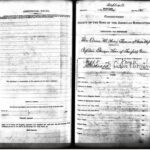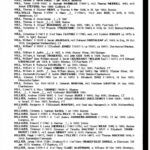
William Hill Sr.
Date of Birth
1594
Place of Birth
Lyme Regis, Dorset, England
Towns / Cities Moved Into
-
Known Occupation
-
Religion
-
Spouse
Death Information
Year of death
September 1649
Place of death
Fairfield, Connecticut
Cause of death
-
Obituary

Parents

James Hill

Judith Jurdaine
Marital Status


Married Marry (Wyne)
October 28, 1619
Exeter, Devon, England.
Siblings







Children






Narrative / Story
William Hill Sr.’s life story unfolds like a tapestry of early modern English and American history, rich with the colors of adventure, resilience, and the pursuit of new beginnings. Born on May 27, 1586, in Barnstaple, Devon, England, William was the son of James Hill and Judith Jurdaine. His early years in the rolling countryside of Devon would have been typical of rural English life, shaped by the land and the rhythms of agricultural seasons.
The turn of the 17th century was a period of significant transformation in England. The establishment of the Honourable East India Company in 1600 marked the beginning of England’s foray into expansive global trade. This era was also characterized by religious upheaval and a yearning for new opportunities, as exemplified by the Pilgrims’ historic voyage on the Mayflower in 1620.
In the midst of these changing times, William’s life took a pivotal turn when he married Sarah Jourdain on October 28, 1619, in Exeter, Devon. Together, they welcomed seven children into their family: Sarah, William, Luke, Joseph, Ignatius, James, and Elizabeth. Their life in England would have been reflective of the era’s norms, with William likely engaged in occupations tied to the land or local trade.
The allure of new lands was irresistible to many during this period, and William was no exception. The discovery of the Connecticut Region by the Dutch in 1614, followed by English Puritan settlements, painted a picture of opportunity and new beginnings. It’s likely that these events influenced William and Sarah’s decision to seek a new life across the Atlantic.
Life in the New World, specifically in Connecticut, presented a stark contrast to their life in Devon. The challenges were manifold – adapting to a harsher climate, learning to navigate an unfamiliar landscape, and contributing to the nascent community’s survival and growth. William’s days would have been filled with the hard work of farming, building, and community development, emblematic of the pioneering spirit of the time.
William’s journey came to an end in September 1649 in Fairfield, Connecticut. His final resting place in Windsor, Hartford County, Connecticut, serves as a silent testament to a life of courage and adaptation. While the specifics of William’s experiences with socio-economic issues related to race during this era are not detailed, it is important to acknowledge the complex and often fraught interactions between European settlers and Native Americans during this period of American history.
William Hill Sr.’s narrative is more than just a family history; it is a reflection of the broader human story of exploration, settlement, and the forging of new communities. His life, from the pastoral landscapes of Devon to the uncharted territories of Connecticut, mirrors the larger narrative of early American history – a story of endurance, community building, and the relentless pursuit of new horizons.

